- Home
- Hughes, Rhys
The Smell of Telescopes Page 4
The Smell of Telescopes Read online
Page 4
“But let me tell you of the time I bartered both. The world was a younger place then; we did not value so highly such things as trousers and souls. The former were objects merely to be worn; the latter were baubles brought out over dinner to amuse guests. Neither had pride of place in the wardrobe, as they do now.”
“I do not wish to hear this,” replied the blue dwarf, and he turned to go. But I soon had him by the scruff of his neck and he was forced to amend his statement: “Perhaps I will listen after all.”
“Very good,” I told him. “It is possible you will learn a truth here, though I doubt it. The amoral fable suits my tongue rather better than the moral kind. Attend then, unclouded fellow.
“The region of which I speak is a dreary place in Gwent, by the borders of the River Severn. And there is no quiet there, nor silence. The waters have a saffron and sickly hue; and they do a fair bit of palpitating beneath the red eye of the sun...”
The blue dwarf sighed: “Bugger!”
Actually, I exchanged my trousers for a clock and a carrot, and lost my soul as I was doing so. Do you know Monmouth?
The market there is notorious for pickpockets; I knew this before I set out, yet took no precautions. I was intent on driving a hard bargain for my trousers. The imps who run the stalls are good at offering low prices for any items that come their way. They can talk the meanest miser into parting with his silver for a length of old rope. It is essential to be on your guard at all times.
Nor are they too particular about where their goods come from. I suspect the clock I received fell off the back of a steeple, and the carrot had been uprooted from an allotment. But I was desperate; and the imps and their customers are protected by the market-overt law. This states that goods sold at such markets, whether stolen or not, cannot be returned to the original owner (with the clock came an irate pastor).
Anyway, after I had spent an hour or so talking the stall-owner into giving me the clock and carrot, and had divested myself of my baggy britches, I made my way back to my house. Halfway home, I realised that my soul was missing. Nimble fingers had filched it. Doubtless it could now be found on a soul stall. But I had nothing on me with which to barter it back. I decided it would keep until the following morning, when I would return with an umbrella and a parrot.
In my kitchen, I made a thin soup with the carrot and set the clock above my hearth (the pastor grumbled about the fire and claimed it was singeing his heels.) At last there was a knock on the door and Myfanwy stood on the threshold. I invited her in, showed her the clock, poured the soup and gazed into her large brown eyes. The combination of broth and timepiece so impressed her she consented to marry me at once—the effect I had been aiming for. “Hurrah!” cried I.
We finished the meal and listened to the clock striking the hour. She suggested we go out for a walk. I declined, of course—I had no trousers. I made some excuse about wishing to stay at the table to hear the clock strike another hour. She thought this an excellent idea and suggested we pass the time by playing dice with our souls. Again I made my excuses; I told her my soul had caught a cold and had to be kept inside. She saw through this deception at once.
“And to think I nearly kissed a man without a soul!” she growled. She stood up to leave and I rushed to restrain her. She glanced down at my bare legs. “What’s more, without trousers too!” she added. It was all I could do not to fall on the floor and burst into tears. I fell into an easy chair and burst into tears instead.
Myfanwy had left me, and my efforts at seducing her with pendulum and root-vegetable had come to nothing. She was the greatest baker of blueberry pie in the region and men of all kinds came flocking to her oven; she could afford to be choosy. She had picked off the crust of my amorous overtures to expose the lack of filling beneath. I had lost her for good. Let this be a lesson to all young lovers, especially in these days, when inflation and curry has pushed up the price of both trousers and souls. Wear the former and ’ware the latter.
The following morning, I took my umbrella and parrot to the market in an effort to retrieve my soul. But it had been sold. I was much put out by this. The imp who owned the stall offered to do me a very nice soul in maroon-and-black, but there is nothing quite like having your own. It fits you like a favourite overcoat, or like an idea in a single word. The imp would not reveal to whom he had sold it. I decided to cut my losses and concentrate on buying back my trousers.
Incredibly, it seemed that these had also been purchased. I was so stupefied that I relaxed my guard and ended up exchanging my umbrella and parrot for a pair of tinted spectacles. I wore the spectacles—they turned everything as blue as my funk—as a reminder to myself never to be so foolish again. Indeed, I have never taken them off. I sat on the side of Monnow bridge (if you do not know Monmouth, this is quite close to Agincourt Square, behind the giant waterwheel) and dangled my legs above the fetid river. As I was grumbling there to myself, Owain ap Iorwerth came up to me. “What’s the matter, Gruffydd?” he chortled, pleased to find me in a state of despair. I told him. “Oh well!” he grinned and slapped me on the back. I think he meant me to fall into the ravine, but I merely coughed loose a tooth.
Owain ap Iorwerth, you see, was my greatest rival for the hand of fair Myfanwy. I made my way home and, too depressed even to finish off the soup I had so lovingly prepared the day before, took to my bed. But then I was startled by a knock on the door. I was overjoyed to find Myfanwy there, holding my trousers and soul.
It seemed I had misjudged her. She loved me, to be sure, and after storming out of my house had made her way to the market. There she had searched for the items and bought them for me. My clock and carrot, she quickly confessed, were so utterly remarkable, both as singular objects and also as a sum greater than the parts, that she had seen the error of her ways. She begged my forgiveness.
Naturally, I told her it was I who needed to apologise. After some thought she agreed; I did so and we fell into each others arms. But, unfortunately, this is the real world; life is a sour cream poured on stones. It soon became apparent that she had sold her own trousers and soul to purchase mine. A hatstand and three harpoons had been thrown in.
I was in a quandary. How could I marry a woman without trousers or soul? Neighbours would gossip; I should be ashamed to show myself in public. I did not mention this to her, of course; I am a sensitive sort of man. The sort of man who does not despise pink socks because of their colour, but because of their hue.
In the days that followed, I did my best to act as if nothing was amiss. But her blueberry pie lost its flavour, and her lithe limbs lost their ability to slide against mine without friction. More to the point, when we went out with each other, people stared at us. They suspected she was lacking trousers and a soul; you could see it in their eyebrows, which jumped alarmingly whenever we approached. Some even made jokes in our presence. “That’s the spirit!” they would cry, or, “What a turn-up for the books!” Pedestrians can be very cruel.
Owain ap Iorwerth noticed as well, because one day she left me for him. He had done the noble thing, buying back her trousers and soul and returning them to her. This showed me up as a thoughtless lover. The irony was that he bartered his own soul and trousers to obtain hers. I gritted my teeth and, in order to impress Myfanwy with my sacrifice, re-exchanged my trousers and soul for Owain’s. This had the desired effect, but only for a while.
The long and the inside-leg of it is that all three of us ended up exchanging and re-exchanging our trousers and souls a great many times. It was a ludicrous and vain episode of my life. Eventually, after a year of this fabric-and-phantom farce, the trousers and souls were jumbled up and we did not know which was which. It is an unbearable sensation, not knowing if your trousers and your soul are the ones you were born with, and we all rushed off in opposite directions, taking up residence in the three corners of the scalene world.
Before I left Monmouth, I made sure I took a blueberry pie with me, to remember Myfanwy by. And it still remains u
neaten in my pocket. The day I meet her again will be the day I take a bite; the day I encounter Owain ap Iorwerth will be the day I beat him to death with it. It is tasty and solid enough for either eventuality.
“And that tale is absolutely true,” I told the blue dwarf, “which is why you shall never succeed in removing my trousers or my soul. I suggest you run along and torment someone your own size. I spy a woodlouse down there; it has a waist more your size.”
“You fool!” The blue dwarf wriggled out of my grasp. I could see now that he was not really a dwarf; he was standing on his knees. When he arose, he was almost my own height. He pulled off his wig and his coat and stood there before me with a wide blue grin.
“Myfanwy!” cried I.
“Yes, you fool!” she returned. She reached into her pocket and took out a blueberry pie. “At last we meet again! I have been searching for so many years. Our trousers and souls were indeed jumbled; you have mine and I have yours. That is why I asked you to remove them. Now we can be married and live in near bliss for months!”
I shook my head. “A disguise, eh? I suspected this all along.” I pulled off my own wig and removed my own coat. “I am not Gruffydd after all; I am Owain ap Iorwerth. And I have come to take you away with me, to claim your love and your baking talents!”
Myfanwy threw back her head and laughed. “Exactly as I planned! You have fallen into my trap!” She removed her new wig and took off her new coat and it was Gruffydd himself who now glared at me. He shifted the blueberry pie in his hand and prepared to lunge. “At last I shall be avenged! I have waited long ages for this.”
“Ha!” I screamed. I followed his example; I pulled off my new wig and discarded my new coat. And then I jumped off my stilts and snatched the blueberry pie from his trembling fingers. “A blue dwarf!” he cried. “What is the meaning of this?”
I reached forward and pulled the tinted spectacles from his nose. At once he understood. He bellowed: “You are not a blue dwarf at all. You are a yellow imp!” I nodded and raced back to the market.
The bottom has dropped out of the trouser market; there is no longer life in souls. Blueberry pie is the new thing. Sometimes we resort to devious tactics to get it.
The Purloined Liver
“Purloin My Liver,” said Edgar.
“I beg your pardon?” Annabel frowned and steered around the carcass of a sheep. Flies rose in a dark cloud.
“The village.” Edgar folded the map and gestured at the collection of thatched cottages. “Purloin My Liver. An old market town. Stop in that pub and I’ll buy you a drink.”
Annabel assented and parked off the road. As she stepped out into bright sunshine, she gazed at the signpost that hung from the side of the building. “Odd name for a pub!”
Edgar shook his head. “We’re in the sticks now. This is rural heritage.” He followed her gaze upwards. “The Plucked Eyeball? Sounds rather quaint to me. I like it.”
Annabel shrugged and followed him inside. The bar was deserted and gloomy. The warped beams of the low ceiling forced them to crouch down to avoid striking their heads. “Anyone home?” Edgar cried.
The barman appeared from the cellar. “What’ll it be?” He was a grotesque figure, obese and hunched, a meerschaum pipe in the shape of a screaming skull protruding from his mouth. His dirty moustaches drooped like dying vines. A single, bulging, working eye rolled endlessly in its socket; the other dangled loose on his cheek. “What do you have on cask?” Edgar inquired mildly.
The barman rested his gnarled hands on the unlabelled pump-handles. “Leprous Pustule, Purple Haemorrhage, Garrotted Baby, Witch Burn, Eat My Cousin and Twisted Ear.” He turned to another part of the bar. “This is Severed Torso, a sour cider. Bloodless Zombie is a pale ale.”
“A pint of Twisted Ear please,” said Edgar.
“Half a Severed Torso for me,” added Annabel.
The barman drew the pints. “Travellers eh? Off to the Fair at Grind My Bones? Should be good this year. A wicker man stuffed with virgins. Reverend Cleaver grew them himself: real virgins!”
Edgar remained nonchalant. “Sounds fine.” He knocked back his pint. “We’ll give it a try.” He seized Annabel’s glass, drained that one as well and handed money over the counter. “Have one yourself.”
“Very kind of you sir, don’t mind if I do!” The barman poured a foul green mixture. “Crucified Toad. I brew this one myself.” Instead of placing the glass to his lips, he held it under his cheek and lowered his prolapsed orbit into the murky depths. Once immersed, the eyeball took on a life of its own; it rose and fell in slow circles, refracted to hideous dimensions by the viscous fluid.
Outside again, Annabel smirked. “What an odd fellow!”
“Not at all; we’re in Shropshire now,” Edgar reminded her. “Look, sorry for hurrying you on. But I’d hate to miss that wicker man. These are real country ways! Cream teas and brutal prejudices!”
Annabel started the engine and pulled out onto the road. “What’s so special about burning virgins? Why not teetotallers or bank-managers or poets? Why not travellers for that matter?”
Edgar chuckled softly. “It’s just that virgins are flammable. Most people aren’t. It’s like pebbles and coal.” He consulted the map. “Grind My Bones is the next village along. Left at the fork.”
“I see.” Annabel turned a sharp left and followed the road between towering hedge rows. Conditions grew steadily worse; the car began to bounce and shudder. She cleared her throat. “What did your pint taste like? Mine tasted like squeezed abdomen.”
“I know.” Edgar nodded to himself. “Mine was sort of waxy. Real ale, you see. None of that fizzy rubbish we get in the city.” He leaned out of the window. “I can’t see any wicker man. I can’t hear any virgins screaming either. They do scream, don’t they?”
“Perhaps they just whimper.” Annabel cursed as the road became a mud track. They reached a dilapidated farm-house and saw it was a dead-end. “We must have come the wrong way.”
“That’s impossible. Stop the car and I’ll ask directions.” Edgar waited for Annabel to pull up and then jumped out of his seat. The front door of the farmhouse was covered in human hands nailed to the rotting wood. Edgar prised one of these hands loose and rapped on the door with it. Bolts slid back and a thin man peered out.
“Yes?” The man blinked at Edgar. His eyelids worked upwards; his eyes had obviously been put on upside-down.
“Is this Grind My Bones, or anywhere near it?” Edgar asked. “We’re off to see the virgins burn.”
The man sighed sympathetically. “This is Applaud My Death. You must have taken a wrong turning.” He squinted at the map Edgar offered him. “Oh no, you don’t want to be trusting them old things. The men who draw them are liars.”
“Really?” Edgar rubbed his jaw.
“Besides,” the thin man continued, “you’ll be lucky to see anything roast today. The wicker man’s been cancelled. Reverend Cleaver’s virgins all caught the pox and died. He hasn’t been able to rustle up any more. Why do you think I’m at home?”
A sudden idea struck Edgar. He whispered something to the thin man. The emaciated fellow chuckled and rubbed his palms together. “In that case you’d better come in and have a bite to eat. I’ve got some Minced Grandmother in the pantry, or you can have Basted Forehead.”
“What’s the traditional local dish?” Edgar asked.
“Shepherd’s Pie with vegetables. Real shepherds: crook, smock and dog. Watch the splinters. The vegetables are brain-dead poachers. Or you can have Poacher’s Pie with brain-dead shepherds.”
Edgar walked to the car and returned with Annabel. They followed the thin man into the interior of the farmhouse. They sat down at a table in the kitchen while their host rattled pots and pans over the stove. “This is real living!” Edgar enthused. “Honest food and honest folk. They really know how to force agricultural labourers between pastry here! No corners cut; the whole labourer, with a cheese topping!”
“So
unds grand.” Annabel licked her lips. She picked up the knife and fork before her. The knife was fully twelve inches long, a vicious blade encrusted with blood. The fork had a tongue impaled on each of its cruel tines. She tentatively licked one; it was a male tongue. Edgar glared at her and she blushed bright red.
“Hussy!”
The meal was astonishingly filling. It was washed down with glasses of Adam’s Apple Cider. While they were eating it, the thin man disappeared for some minutes to make a phone call. Edgar and Annabel could hear him mumbling something in the hallway. Edgar covered his smile with a grimace picked from the pie. Annabel shook hands with her meal. “Stop playing with your food!” Edgar roared. He belched a red belch. “Yum!”
Eventually, the fellow rejoined them. “Well that’s settled then. Are you ready for dessert?”
Annabel shook her head. “We’d better be off, really. We’re just passing through, you see; on our way to Stafford to visit relatives. We thought it would be nice to make a detour through Shropshire, rather than taking the motorway.”
“Nice?” The thin man seemed confused. He pulled at his forelock, the one strand of hair that remained on his head. “Is that a foreign word?” He brightened. “The road between Impale My Dog and Heretic On Pyre is blocked. You won’t reach the border by nightfall.”
Edgar reached out and placed a hand on her arm. “We don’t want to cause offence. Let’s just stay a little longer.”
Annabel shrugged and assented to dessert. It turned out to be a type of Spotted Dick—though the thin man insisted it was called Diseased Tom. As she ate, she could not fail to notice the way Edgar and her host kept glancing anxiously at the clock on the mantelpiece.

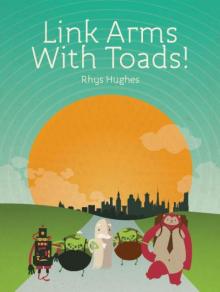 Link Arms with Toads!
Link Arms with Toads!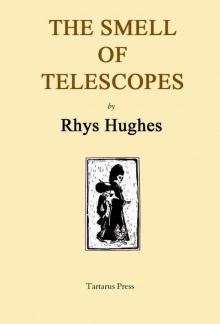 The Smell of Telescopes
The Smell of Telescopes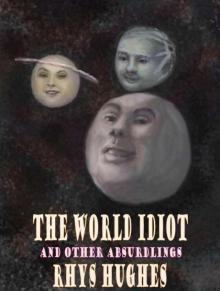 The World Idiot
The World Idiot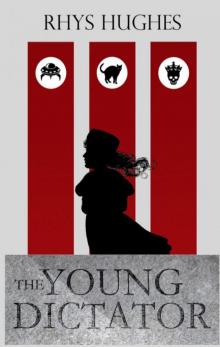 The Young Dictator
The Young Dictator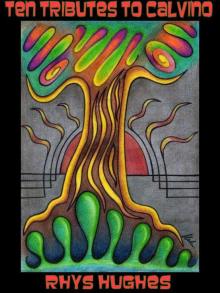 Ten Tributes to Calvino
Ten Tributes to Calvino